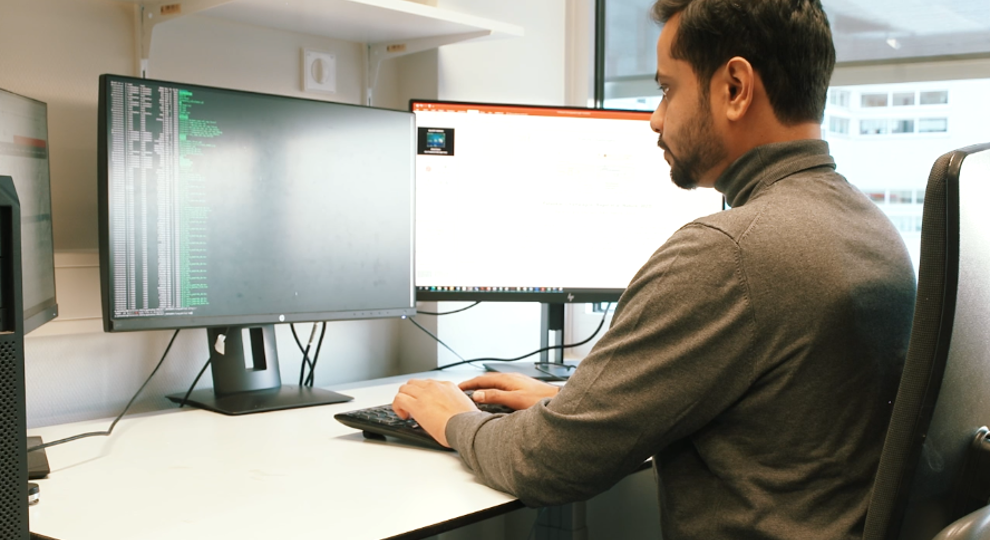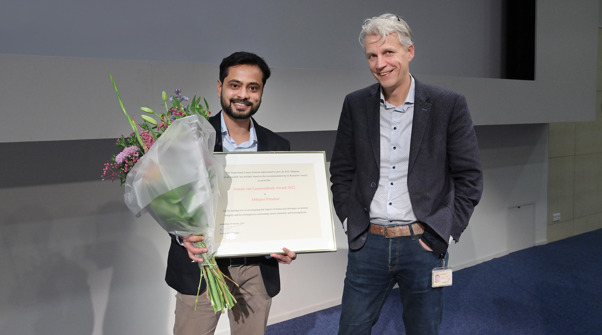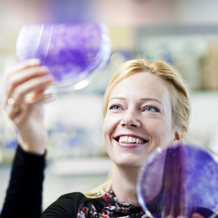Abhijeet Pataskar wins Antoni van Leeuwenhoek award 2022 with discovery of strange protein
16 Jan 2023 19:00
Researcher Abhijeet Pataskar has been awarded the Antoni van Leeuwenhoek award 2022 for his groundbreaking discovery. Using computer models he found a special mechanism by which tumor cells could potentially be recognized in new forms of immunotherapy.
Strangely enough cats and dogs played a small role in his discovery. Pataskar laid the groundwork for what later would become his career as a teenager when he worked on a computer project in which he taught an algorithm to recognize pictures of these two popular pets. "I was already interested in the possibilities of computer programming back then. Back then I was wondering: could I teach a computer to distinguish between pictures of dogs and cats?”
Close-up of a kat
Met die vraag in zijn achterhoofd begon Abhijeet Pataskar te programmeren in zijn vrije tijd. En met succes. Hij ontwikkelde een algoritme dat de twee soorten huisdieren met grote nauwkeurigheid kon herkennen op foto’s. “Je kon een foto invoeren, en dan vertelde het algoritme je of er een hond of kat op stond. Het maakte niet uit of het een close-up was, of een foto van veraf.”
Zijn huidige werk lijkt volgens Pataskar een klein beetje op wat hij als tiener deed. “Op een bepaalde manier doe ik hetzelfde. Ik leer de computer om patronen te herkennen in data. Alleen gebruik ik nu geen foto’s van honden en katten meer, maar gedetailleerde moleculaire profielen van tumorcellen.”
Faulty proteins
Pataskars background is in bioinformatics and molecular biology. At the Netherlands Cancer Institute he analyzes biological data using computers to understand the course of cancer. This year, his research on proteomic profiles of tumor cells earned him two publications in the renowned scientific journal Nature. Together with his colleagues in Reuven Agami's research group, he discovered a strange phenomenon in these cells. Tumor cells often make a special protein that they should not be making according to their DNA code.
Amino acids are the building blocks of proteins, and proteins are the functional unit in the cells. They perform most of the cell’s functions. When there is a shortage of an amino acid called tryptophan, normal cells pause their production of new proteins. But tumor cells behave differently, Pataskar discovered. “Tumor cells continue to produce proteins," he explains. "They just use different building blocks, opting for the amino acid phenylalanine instead of tryptophan." These formerly unknown proteins are now called ‘substitutants’. The discovery of this mechanism might make it easier to detect tumor cells in immune therapies.

Better immunotherapies
Current immunotherapies use T cells that can recognize certain genetic mutations in tumor cells. The only problem is that not all tumors have the right mutations. Patients with these tumors often don’t benefit from immunotherapy as much.
Pataskar believes that his findings could lead to more effective immunotherapies using T cells that are able to detect and destroy tumor cells with peptides from ‘substitutant’ proteins. “These substitutant proteins built from phenylalanine instead of tryptophan can be found in most tissues where cancer occurs. If we can develop a type of immunotherapy in which T cells recognize this property, we will probably be able to treat more people successfully."
He is very glad to receive the Antoni van Leeuwenhoek award. "It’s a great boost for our research. I hope that we will be able to treat the first patients with a type of immunotherapy resulting from my research in only a few years."
Acid in the bathroom
Pataskar emphasizes that his curiosity about science didn’t always result in awards and prosperity. When he was little he once stole a bottle of hydrochloric acid from the chemistry lab at school, a substance that reacts strongly to marble. "I wanted to see the reaction for myself, so I poured it all over the marble in our bathroom. I burned a big hole in it."
That got him into quite a bit of trouble with his parents. "It was obviously very dangerous. I could have easily burned my hand or foot with hydrochloric acid. It was a stupid thing to do, but it is a good example of my curiosity about the way biological processes work. In a way, that curiosity also helped me win this award.”
AVL award
The Netherlands Cancer Institute awards the Antoni van Leeuwenhoek award every year to its most talented young researcher. The award is worth 6000 euros, which will go towards new research. The award, which was first given out in 1988, is partially financed by NKI alumnus prof. dr. Roel Nusse from Stanford University. The Netherlands Cancer Institute wishes to express its gratitude to him.
 nl
nl
 Nederlands
Nederlands

